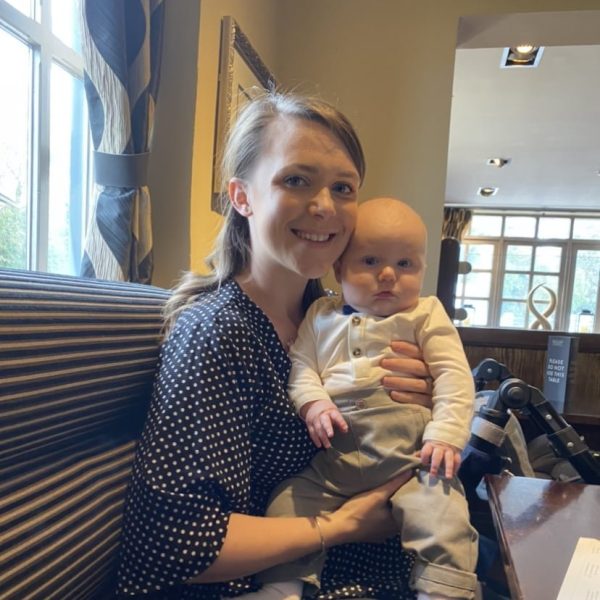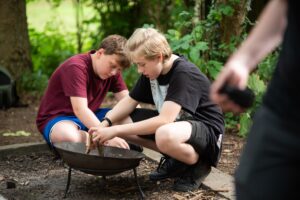This month, we spoke to Cali Price, a teacher from Frogmore Community College in Hampshire. She spoke to Little Troopers about why service pupils often face uncertainty and change, how schools can help support students by getting to know them and their families and why schools should focus on providing a safe and consistent environment for military children.
Tell us about yourself and how you came to be a teacher.
I am an assistant faculty leader and teacher in a secondary school in Hampshire. I teach Dance and P.E and got into teaching after having an inspiring teacher in my own secondary school. I am also the wife of a Welsh Guard and a mum of two little troopers. I feel very lucky to have a career that I am passionate about.
How many military children are there in your school?
I teach in a small school with less than 800 students. We’re close to a large ‘military town’ so a portion of our students have links with the forces.
How does your school support forces’ families?
We are lucky to have an amazing welfare provision that isn’t exclusive to military children. We work hard to get to know each individual child and we have a strong family ethos which means we provide an outreach link between each child’s home and school. As well as pastoral provision for students we also use the Service Pupil Premium to support educational school trips, revision resources and supplies that benefit the learning environment of military children.
Do you have a connection to the military? If so do you think this helps you when interacting with the service pupils?
We have an incredible team comprised of a plethora of ex-servicemen, children of, and the spouses of service personnel. I’d be hard pressed to find a department in the school that doesn’t have a connection to the forces, including myself. This definitely gives me and the other staff an insight into the challenges military life can bring.
The vital difference between military children and other students is the one consistent in their lives. uncertainty. My understanding of this has been magnified since becoming a parent. There have been days where my child has returned home from school to find his Dad has been called away quickly or missed major events like sports days which he had planned to attend – not to mention the added safety concerns of having a loved one serve in the Armed Forces. I personally understand how it feels to wave off a loved one for a long tour, send blueys not knowing when you’ll get a reply, living in a magnolia box and the frustration of how life can turn on a two-pence. But I also deeply feel the sadness and insecurity of those moments too. Knowing this gives an insight into how a student can feel throughout the peaks and troughs of military life.
What initiatives or projects have worked particularly well?
There is a huge list of provision; initiatives for military pupils and publications of how Service Pupil Premium is spent, but the thing I find best supports military students (and students in general actually) is getting to know the students and their families. This and this alone provides invaluable insight into how we can best support children, which can then be enhanced by things like SPP or welfare facilities and resources like pastoral staff and the Little Troopers schools pack.
Why do you think it’s important to offer targeted support for military children in school?
A military child can be different for so many reasons. There can be lots of positive differences, such as resilience, exposure to broader culture and often being wise beyond their years. But listing the reasons that can negatively impact a military child’s education would take me all day.
As a teacher the most important thing you can provide is a consistent and safe environment. An environment where a child feels safe to ask questions, express themselves and feel cared for. Military children face constant uncertainty and change, so providing students with a safe, consistent environment allows for them to flourish both as a student and a person so they can grow and achieve all that they are capable of in the time they are under your educational care.
Providing ‘normality’ in a life of abnormality is key. For example, if a child has a deployed parent and there is a short window for communication on face time, allow them that time. If they have just been posted and moved home and their internet hasn’t yet been connected, ensure this is communicated with the correct staff to prevent an awkward conversation about homework or why an email hasn’t been replied too. If you cannot target support for a military child, you devalue the sacrifice the parent of that child makes.
Answering as a parent, it’s having the school on your team. Knowing a member of staff is there when times get tough and having the extra support to champion your child. As an example, when my husband was deployed recently it coincided with my five-year-old son learning about Remembrance and Armistice at school and this filled me with anxiety. I spoke to the class teacher and it was managed sensitively and with care. Knowing that the class teacher was aware of my concerns ensured the approach was tactful and targeted. It also gave me peace of mind to know that the school were able to follow our family approach to deployment. Having someone take a minute on the school gate to ask “Is there anything we can do to support your family right now?” means so much.
In your experience, what are the biggest challenges faced by military children in school?
Being unseen. So many children of military families aren’t always known to schools because the SPP register is self-declared. If a parent doesn’t declare they are active service personnel the child may ‘miss out’ on the additional provision. Here is where knowing your students is so vital as a teacher.
Secondly, the uncertainty that life as a military child can bring can impact education in so many ways: the establishment of friends when you’ve been posted mid-year; not knowing what GCSE’s to select in case you move schools again; not having a time endured relationship with a staff member they trust to offload too. These stresses can be magnified in an environment where many others are living a ‘normal’ life. Knowing their ‘normal’ means you know what makes them tick, when to play superhero and sweep in with respite support or just being there to lend an ear. Building relationships (or not) can be the biggest inhibiting factor to a child’s learning and development.
Have these challenges changed during your time as a teacher?
I have taught in a few different areas in my time as a teacher; always with military children in my school. The challenges – regardless of the financial status of the child or the school – have always remained the same. The obstacles of the obligations of military life do not discriminate. The students in my experience have an added layer of pressure to their normal educational life.
Every military child is unique, as is each school’s approach to supporting them. However, I would argue that provision is stronger and more on the forefront of the educations priorities in areas where there is a higher proportion of SPP students. Regardless of the data, every child matters and that is the fundamental building block of all education: every child matters.
What advice would you offer to other teachers and schools working with military children?
Listen to the needs of your students and families. Hear what needs to be said, support where you can emotionally, financially and with time. I cannot stress enough how important having consistent communication is. If that means the SPP is spent on time for emails and calls to be sent to the military children’s families, or it is spent on a resource pack to support staff and students who need it, ensure it gets done. Knowledge is power, now this doesn’t mean the school need to know the dates and times of every deployment and posting (because let’s face it we don’t know half the time) but having a brief overview can help.
A child-centred education provides the best opportunities for children to access learning and accomplish what they want to. Get to know the student and their needs, but also know what tools you are working with. There is provision out there that your school or facility may not be aware of. If you can’t see the change, be the change.
The best moments being a teacher is seeing your students succeed. I have never been prouder and more rewarded in my career than in moments where I hear an ex-student of mine has managed to secure their dream job because against all the odds of being a military child, they’ve succeeded. Knowing you can have that impact on a child life is one of the greatest powers of influence and the biggest honour you will wear throughout your career.






